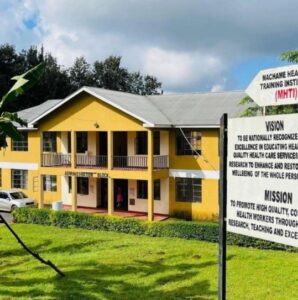 The history of MHTI is rooted through the establishment of Machame Hospital in 1904. The Germany missionaries established and managed the hospital through (1940-1945). The idea of establishing the MHTI was pioneered by Dr Olson and Sr Margaret Friberg from Germany in 1946. The intention was to build capacity of local medical and paramedical professionals to manage Machame hospital. Dr Rudolf Schmidt and Dr Von der Heyden started to mobilize financial resources and secured fund from “Bread for the world”. Penfold & Company built the institute from 1965 – 1969. First batch of 17 boys were enrolled for medical assistant course on March 1969.The Institute run its programs according to guidelines of the National Council for Technical Education (NACTVET). The Government has been offering partial financial and human resources support.
The history of MHTI is rooted through the establishment of Machame Hospital in 1904. The Germany missionaries established and managed the hospital through (1940-1945). The idea of establishing the MHTI was pioneered by Dr Olson and Sr Margaret Friberg from Germany in 1946. The intention was to build capacity of local medical and paramedical professionals to manage Machame hospital. Dr Rudolf Schmidt and Dr Von der Heyden started to mobilize financial resources and secured fund from “Bread for the world”. Penfold & Company built the institute from 1965 – 1969. First batch of 17 boys were enrolled for medical assistant course on March 1969.The Institute run its programs according to guidelines of the National Council for Technical Education (NACTVET). The Government has been offering partial financial and human resources support.
In 1972 the government took over all the running costs of the institute but the supervision was left in the hands of the ELCT-ND. Since 1973 the government has been allocating employees to the institute through a special second ment program. Machame hospital has been the main teaching centre for the institute since its inception. The two institutions developed a MoU to govern and guide smooth conduct of respective core functions.
The institute has experienced gradual growth over years in terms of programs, number of students and staff members. In 2010 the institute started a diploma program in nursing and to date the program has enrolled more than 353 students while clinical medicine program has so far enrolled more than 2587 students. The Institute has gone through a number of stages of accreditation by National Accreditation Council for Technical Education (NACTE) and currently the college is fully accredited by the NACTVE. The Institute has a well-established and functional advisory board that has responsibility to ensure sound governance and management systems, development of facilities, mobilization of resources, investments and appointments. The principal is responsible for the overall coordination and supervision of the programmes and the day-to-day running of the Institute.